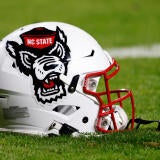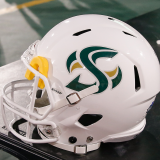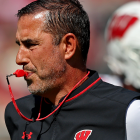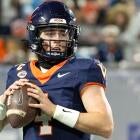How Clemson unleashing Deshaun Watson's legs can change the entire playoff
The Heisman Trophy runner-up using all of his attributes could win the Tigers their first title since 1981

CLEMSON, S.C. -- Deshaun Watson is about to be unleashed again.
We've seen the arm all year as the Heisman Trophy runner-up completed 67.6 percent of his passes for 3,914 yards with 37 touchdowns to 15 interceptions.
We haven't seen the legs quite as much. The runs are about to come if Clemson is going to beat Ohio State in the College Football Playoff semifinal play for the national championship, as Watson promised one year ago after losing to Alabama.
"I think for us to have a chance to win this game, he has to make plays with his legs," Clemson coach Dabo Swinney said. "Sometimes he's made plays with his legs. He's run the ball, but he's made passes. Those don't go in the rushing stats."
Think of Watson's running ability like fine china. There's only so many times you want to take those dishes out to risk cracking them again. You save your china for special occasions.
Watson is running the ball 9.8 times per game in 2016, down from 13.8 in 2015. Last year, he averaged 22.3 carries in the last four crucial games against South Carolina (21 carries for 114 yards, three touchdowns), North Carolina (24 for 131, two TDs), Oklahoma (24 for 145, TD) and Alabama (20 for 73). He hasn't had more than 17 carries thus far in 2016 (he ran that often in close wins over Florida State and at the ACC Championship Game vs. Virginia Tech).
What takes Watson to another level is his ability to move the chains with his feet. Just that running threat alone can create a rhythm for Clemson's offense that's hard to stop with Watson, who tore his ACL in 2014. In last season's national title game, he made plays with his legs and arm that frustrated Alabama coach Nick Saban so much that he boldly called a successful onside kick in the fourth quarter to steal a possession.
The moment rarely seems too big for Watson, who has played in four conference championship or playoff games. In those contests, he averages 21.3 carries for 108.5 yards (5.1 yards per carry). For the rest of his career, Watson averages 9.8 carries for 43.6 yards (4.5 yards per carry).
"I'm just prepared for the moment," Watson said. "I believe God put me in this position for a reason to showcase my skill. ... Keep it simple. Don't make it bigger than it is. All it is is just football, but more people watching, that's it."
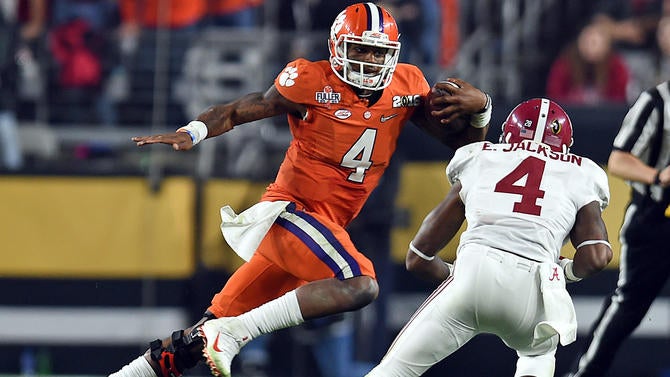
Why is Watson running less?
There are different explanations given as to why Watson hasn't run the ball as much in 2016.
For starters, the passing game has excelled with the return of wide receiver Mike Williams, who missed most of 2015 with an injury. The Tigers relied heavily on four freshmen receivers last season and needed Watson's legs more. With Williams able to open up even space for Jordan Leggett, Artavis Scott, Ray-Ray McCloud, Deion Cain and Hunter Renfrow, Clemson has thrown the ball six more times per game in 2016.
Another reason Watson has run less is how defenses have schematically defended Clemson. They seem more inclined to make Watson prove himself as a passer than as a runner.
"For whatever reason -- maybe it's because we see our guys throw and catch on the practice field and they don't -- people have decided to load the box a little more and put those guys in one-on-one situations," Clemson co-offensive coordinator Jeff Scott. "When they're going to do that, we're definitely going to take advantage of that and throw that."
Perhaps most importantly, Clemson has "scheduled" how Watson runs for the long haul, so to speak. Scott said the quarterback run is always part of the weekly package. But there are games the coaches ask themselves if they really need Watson's runs, or if they can save those hits and looks for the late championship run in what could be a 15-game season.
"No question," Scott said. "That's exactly what happened last year. When you're planning ahead and hoping you're playing for a long time, you want to space that out right way when you can. We've been fortunate we've had enough playmakers to move the ball and score points without counting on [Watson's runs] too much early in the year."
Another unspoken element to this equation: Watson's strong views that he's much more than a running quarterback.
"People think, 'Oh, he's a black quarterback, he must be dual-threat,'" Watson told Bleacher Report in an interview last August. "It's lazy. ... It's a stereotype put on me for a long time because I'm African-American and I'm a dual-threat quarterback. I don't know why that stereotype is still around. It's about talent and the ability to throw the ball, not the color of your skin or your ability to also be a dangerous runner. It bothered me when I was young until I finally realized the only way to change it is to make your mark on the field and force them to see. So that's what I've been doing."
Watson said this week he has no problem running to help win games. That may be needed more than ever to help Clemson's rushing game, which declined significantly in 2016 with 4.5 yards per carry (tied for 63rd nationally) and 173.1 rushing yards per game (69th). The Tigers are the only playoff team not in the top 20 for yards per carry, though Alabama won the title last year ranked 46th.
Consistent production from running back Wayne Gallman and the offensive line played a huge role in Clemson's 2015 run to the national championship game. The Tigers ran for 4.9 yards per carry (tied for 30th) and 223 yards per game (21st) in 2015.
In the Tigers' only loss this year, Pittsburgh stuffed Gallman on third-and-1 and fourth-and-1 to secure the upset. Gallman had 100-yard games late this season against Wake Forest and South Carolina but got held to 59 yards on 17 carries by Virginia Tech at the ACC Championship Game. That forced Watson to contribute with 85 rushing yards.
"There are times we could do a better job running the ball, for sure," Scott said. "The whole time we're taking what the defense gives us and we're going to have the running game when we need it. It's a long year. You plan to have 15 games and you have to kind of schedule it the right way."

Criticism over interceptions
Watson knows all about long years. After Week 2, Watson apologized publicly for his "negative energy" that he thought contributed to the team's sluggish start. He said at the time he had to "find myself" after all of the offseason attention that he enjoyed while building his brand.
"You could tell it was getting to him a little bit," wide receiver Hunter Renfrow said. "He'd just been on the go so much since last year. I think he was just kind of overwhelmed for a little bit and wanted to say, 'I'm sorry,' and kind of clear his mind and get some things off his chest. It was basically, 'Let's go, let's have fun again, let's play the game we've always loved.' It wasn't necessarily necessary, but it was a good point to put all this behind us and move forward. He's always been that even-keeled, calm leader."
Watson said this week his early-season remarks were meant to get his teammates to play better, including himself.
"It wasn't so much an apology because I have no reason to apologize to anyone," he said. "I go out there and put in the work each and every week. The energy level wasn't right."
In Clemson's first two games, Watson completed 53 percent of his passes and averaged 270 passing yards with four touchdowns and three interceptions. Since then, he's a 71-percent passer and averaging 307 yards per game with 38 touchdowns and 12 interceptions. Pro Football Focus graded Watson as the nation's top quarterback from Week 9 through the end of the year for the second straight season.
Still, no topic seems to get Watson and Clemson coaches fired up more than criticism of Watson's 15 interceptions. That's tied for the third-most among the nation's 100 most efficient passers. Only Purdue's David Blough (21 interceptions) and Indiana's Richard Lagow (16) have more.
Watson averages one interception for every 32.5 pass attempts in 2016. That's slightly worse than his 2015 rate (one per 37.8 passes). Swinney noted that Clemson throws the ball a lot. That's true as Watson ranks fifth in pass attempts. Still, Watson's interception rate is worse than some of these other talented quarterbacks:
- Jalen Hurts, Alabama: one per 37.4 passes
- Sam Darnold, USC: one per 39.1 passes
- Chad Kelly, Ole Miss: one per 41 passes
- Baker Mayfield, Oklahoma: one per 41.3 passes
- Lamar Jackson, Louisville: one per 42.4 passes
- Jake Browning, Washington: one per 50.4 passes
- J.T. Barrett, Ohio State: one per 69.2 passes
- Mitch Trubisky, North Carolina: one per 102 passes
There are trade-offs, of course. For every interception Watson may throw, there are several more plays he makes to help Clemson. One NFL scout, speaking on the condition of anonymity, said Watson still has to improve his accuracy but believes he will be a starting NFL quarterback.
"I don't think it's going to be Year 1," the scout said. "He still has some development and growth to make with his accuracy and repeating his mechanics. He plays in that spread offense where they toss it around with four wides, so he's going to have to learn to play under center a little bit more, but he can do that. He can be a pocket passer and someone who can scramble. He's got all the intangibles you want from his leadership and personality. I wouldn't call him an elite quarterback, but he's going to be a starter in the NFL."
Said Watson: "People can say what they want to say. I know how accurate I am. I know how efficient I am as a passer. I wouldn't have all the stats if I wasn't accurate and efficient."
Swinney said the public doesn't really understand why the 15 interceptions occurred. Some of them, Clemson coaches acknowledge, were bad decisions by Watson. In particular, Watson looks like he has been baited at times by defensive backs in zone coverage.
Other interceptions occurred because offensive linemen didn't get defenders' hands down, resulting in tipped passes that got picked off. Others came when receivers ran the wrong route. Sometimes a bad play simply got called.
Scott said those who know Watson laugh at the doomsday feeling that's sometimes conveyed publicly about his interceptions. Clemson coaches know Watson as the quarterback with the 30-3 record, 52 schools and the first ACC player to be a two-time Heisman Trophy finalist. They see him as the smartest, most talented and best leader they've ever coached.
"As soon as the season's over and the scouts, GMs, head coaches and offensive coordinators start meeting with Deshaun, he's going to go straight back to the top [of 2017 NFL quarterback draft rankings] really quick," Scott said.
Watson rarely gets flustered. After a pick-six this season, Watson responded by setting a Clemson record with 14 straight completions.
"To talk about the five touchdowns Deshaun threw it becomes, 'Aww, that's Deshaun Watson. That's what he's supposed to do,'" Swinney said. "But boy, he threw two picks, that's big news. I think Deshaun is so good he made people numb to it."
The truth probably lies in the middle. Watson does need to improve areas of his passing game for the NFL, and Watson's brilliance has raised the bar. Watson has raised it himself at times, saying before the season this could be the best offense in college football history and telling reporters after last season's loss to Alabama, "I'll see you in Tampa," referring to the site of this season's national championship game.
"Just because of how I played in the Bama game, the expectations are up here," Watson said, raising his arms above his head. "If I don't meet that expectation each and every week, people think I had a downfall, which is not true. I just look at it as I try to find a way to get the W, be the leader of this team."
It's that time of year again for Watson when finding a way to win means unleashing his legs. Those legs, coupled with that arm and mind, will help determine if Watson meets his promise of taking Clemson to Tampa.





